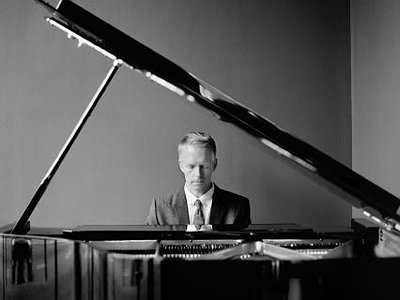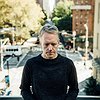Could you take me through the process of composing on the basis of one of your pieces that's particularly dear to you, please? What do you start with when working on a new piece, for example, how do you form your creative decisions and how do you refine them?
For me, at the root of it all, I love melody. It’s the songbird. It’s what connects with the listener. If I’m writing a new piece sometimes I’ll literally scratch some random chords on a blank sheet or draw a whole note for each measure for 16, 32 measures or so. I used to do it as an exercise away from the piano. Sheet music, random bass notes (random within reason) and then I would start placing the 3rd note of the chord in the treble clef. So I now have the root and the 3rd of the chord for each measure. Sometimes I would play the 7th note of the chord in the measure but mostly the 3rd. 3rd & 7th notes are the most important notes in the chord (for me). The 3rd tells you if it’s happy/sad and the 7th tells you either where you’re going or where you’ve been. Now with the 3rd’s in place, I then play through the piece and see if it has a melody based on just the 3rd note of the chord. I then go through and see if I can create a ‘melody between the melody’ by creating a melody between two 3rds (or two measures, basically). Sometimes I won’t need a ‘sub-melody’ and sometimes it just writes itself. One other thing I keep in mind is the 3rd is not written in stone. If going into the 2nd measure of the piece that I’m hearing perhaps a root or the 5th a chord, I’ll then erase the 3rd and replace it with a stronger melody note. The 3rd’s are just a loose guideline to get a piece started and can change when needed. I know this seems a bit disconnected and not very emotional but it’s a process which often leads to a more emotional/connected piece.
What, if anything, do you personally draw from the cosmos of electronic music and digital production tools that is inspiring for your daily practise? In how far do you see the potential for a mutual creative pollination between the two?
Truth be told, I’m rather organic when it comes to production either in composing or practicing. I tend to like things really simple and the fewer distractions before me, the better. Yes, there are unique tools and apps that are wonderful to work with and can spark a creative process but if it’s not something I’m either going to use live or in a recorded piece, I generally don’t bother with it. I used to work a lot with string libraries (virtual synths, whatever you wanna call them) but when all is said and done it just sounds like a pianist writing string parts. I would much rather have the input of someone that knows how the cello fits in the hands, understands the nuances, has dedicated their life to that instrument as much as I have mine. That’s not to say I don’t write parts for some pieces but many times they are ideas to use as launching pads for the other musicians. So I really tend to stick with the basics.
I was a hired gun for a pop singer/songwriter in New York City for a period. The band were all A list players and the music director was also the MD for a very, very well-known artist. My setup was a grand piano and then various keyboards, Hammond B3, programmed laptop, the whole works. Everything was down to a science. One day during a rehearsal he walked behind my setup, unplugged the power and said “imagine we’re coming out of a TV commercial break and the song starts in 15 seconds. What are you going to do?” He was teaching me that nothing was certain and when it came down to it, could I pull the whole thing off with just an acoustic piano. Technology is great, but I would rather explore the absolute range of a piano before I moved on to anything else in the hope of facilitating the void of something I never exhausted.
How do you see the relationship between timbre and composition?
Incredibly important. On The Space Between, with the exception of one song (‘A Love is Born’), I literally wrote the album in a day and recorded the album the following day.
I was asked to score a short film and the director came over to hear the ideas I had written for the piece. Not knowing the felt was engaged on my piano, I struck the first chord and he instantly said “my word, that sound is perfect.” I nodded as if it was my intention all along. I had been playing piano for 28 years by the point and I felt like I had stumbled upon an entirely new instrument! So inspired by the thought of composing an album with this sound I immediately grabbed my pencil and sheet music and started writing. I didn’t leave the room until I had written the entire album. All because I had a new palette of color to work with like never before.
Time is a variable only seldomly discussed within the context of contemporary composition. Can you tell me a bit about your perspective on time in relation to a composition and what role it plays in your work?
For me, it’s not something I think about. The only time I’m actually cognizant of time is when I’m scoring for commercial works (TV/film). A lot of these projects demand a 30 second version and a 90 second of the piece which is very limiting but it can be nice because you know exactly the borders you’re expected to create. However, to craft a piece based on pure emotion or without regard to context, I’m not concerned. I usually let the piece say what it needs to say and sometimes that could be a 6 minute piece such as the Variation on Chopin’s ‘Nocturne in F Minor’ (6:21 to be exact) or my piece ‘She’ which is only 1:34 in length. Both songs say exactly what they need to say in the timeframe they were built in. ‘She’ has been licensed for more commercials than I can honestly remember and there have been times where producers will say, “can you go back and make the piece longer?”, and I tried a few times and it just fell flat. That piece says what it needs to say in 1 minute and 34 seconds, and anything beyond that would simply be rambling.
What do improvisation and composition mean to you and what, to you, are their respective merits?
This is an excellent question because it deals with two absolute opposite ends of the spectrum. As I mentioned earlier, improvisation is composing, however it’s in real time; there are no erasers. Writing or composing a piece allows for erasing but it can also be more refined. For me, improvisation is spontaneous painting. It’s the unexplored avenue, waiting to find what happens next. It all just depends on the taste of the listener and, I find, their mood.
Do you feel it important that an audience is able to deduct the processes and ideas behind a work purely on the basis of the music? If so, how do you make them transparent?
To a very small degree (if any). Personally, I try not to paint too much imagery with the audience. It’s rather uncommon to find two separate listeners that will interpret a piece identically. I would rather the audience create their own story as they’re hearing the pieces rather than being told what emotion they should be feeling or the message of a piece. Music is such a personal medium that I would rather the listener have their own canvas to paint when hearing my music for the first time.




